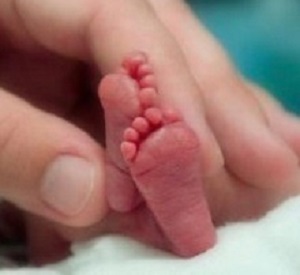 Babies born with extremely low birth weight are not only at risk for physical problems but are also more likely to experience mental health problems later in life, according to an analysis of research conducted over nearly 30 years.
Babies born with extremely low birth weight are not only at risk for physical problems but are also more likely to experience mental health problems later in life, according to an analysis of research conducted over nearly 30 years.
"Our findings provide evidence that individuals born at extremely low birth weight are at higher overall risk for psychological difficulties than their normal birth weight peers. These difficulties most frequently involve attention, anxiety-related and social problems," said lead author Dr Karen Mathewson, McMaster University.
Preterm births have increased dramatically over the last two decades and now make up about 8% of infants born in the US and Canada. Because of improvements in recent decades in neonatal intensive care, babies who are born at extremely low birth weight (less than 1,000 grams or just over 2 pounds) have a greater chance of surviving than ever before.
Mathewson and her colleagues conducted meta-analyses using 41 studies that followed 2,712 individuals who were extremely low birth weight babies and 11,127 who were normal birth weight babies. The studies took place over a 26-year period (1990-2016) in 12 different countries, including the US and Canada.
Extremely low birth weight babies were found to be at increased risk for particular mental health problems, beginning in childhood and extending at least into their 30s. As children, they were significantly more likely to have attention deficit hyperactivity disorder in almost every study included in the review. Adolescents were also at greater risk for ADHD and social problems. Adults born with extremely low birth weight reported significantly higher levels of anxiety, depression and shyness, as well as significantly lower levels of social functioning.
These risks did not seem to vary according to where or when extremely low birth weight survivors were born, or whether they had significant neuro-sensory impairments, such as cerebral palsy or blindness. All of the studies were from developed countries from North America, Europe or Australia.
Mathewson believes these findings may stem from biological responses of the infant to difficult prenatal conditions and postnatal stresses following early birth. "The consistency of the findings across geographical regions suggests that these attentional, behavioral and social outcomes may be contributed to by developmentally programmed, biological factors," she said.
Even though the risk for mental health problems in extremely low birth weight survivors is increased compared to normal birth weight individuals, many will not develop mental disorders at all, Mathewson noted. But the effect sizes for ADHD, social problems and internalising disorders were moderate-to-large in extremely low birth weight children, and remained moderate in extremely low birth weight adolescents. (A moderate effect is generally apparent to an unaided, careful observer). Moderate effects of birth weight status suggest that group differences in the risk for these mental health problems can be significant.
The findings point to the need to continue to provide services to these individuals throughout their lives, according to Mathewson. "It is important that families and health care providers be aware of the potential for early-emerging mental health problems in extremely low birth weight survivors, and that some of these individuals may not grow out of these problems as they get older," she said. "As a result, it is essential that appropriate treatment be made available to those who require it as early in life as possible."
Abstract
Although individuals born at extremely low birth weight (ELBW; < 1,000 g) are the most vulnerable of all preterm survivors, their risk for mental health problems across the life span has not been systematically reviewed. The primary objective of this systematic review and meta-analysis was to ascertain whether the risk for mental health problems is greater for ELBW survivors than their normal birth weight (NBW) peers in childhood, adolescence, and adulthood. Forty-one studies assessing 2,712 ELBW children, adolescents, and adults and 11,127 NBW controls were reviewed. Group differences in mental health outcomes were assessed using random effects meta-analyses. The impacts of birthplace, birth era, and neurosensory impairment on mental health outcomes were assessed in subgroup analyses. Children born at ELBW were reported by parents and teachers to be at significantly greater risk than NBW controls for inattention and hyperactivity, internalizing, and externalizing symptoms. ELBW children were also at greater risk for conduct and oppositional disorders, autistic symptoms, and social difficulties. Risks for parent-reported inattention and hyperactivity, internalizing, and social problems were greater in adolescents born at ELBW. In contrast, ELBW teens self-reported lower inattention, hyperactivity, and oppositional behavior levels than their NBW peers. Depression, anxiety, and social difficulties were elevated in ELBW survivors in adulthood. Group differences were robust to region of birth, era of birth, and the presence of neurosensory impairments. The complex needs faced by children born at ELBW continue throughout development, with long-term consequences for psychological and social well-being.
Authors
Karen J Mathewson, Cheryl HT Chow, Kathleen G Dobson, Eliza I Pope, Louis A Schmidt, Ryan J Van Lieshout
[link url="https://www.sciencedaily.com/releases/2017/02/170213131459.htm"]American Psychological Association material[/link]
[link url="http://psycnet.apa.org/?&fa=main.doiLanding&doi=10.1037/bul0000091"]Psychological Bulletin abstract[/link]
